“Past successes are not an indicator of future performance, particularly in a world where change is now happening at an exponential rate. In order to remain competitive, BC’s economy will need to adapt to these emerging global trends.” -Office of the Innovation Commissioner of BC, Feb 2019
An Introduction to Clusters
After 14 blog posts and a few widely shared articles about the Cluster Initiative, the Cluster team at Foresight thought it would time to discuss two simple questions: 1) what is a cluster? and 2) what does it do?
Perhaps the most widely recognized definition of a cluster comes from economist Michael Porter, an expert in cluster economic theory:
“Clusters are geographic concentrations of interconnected companies, specialized suppliers and service providers, firms in related industries and associated institutions in a particular field that compete but also cooperate.”
The concept is simple at its core - there are economic advantages that occur when a critical mass of related companies are located in the same geographic region.
Location, Location, Location (And Why it Matters)
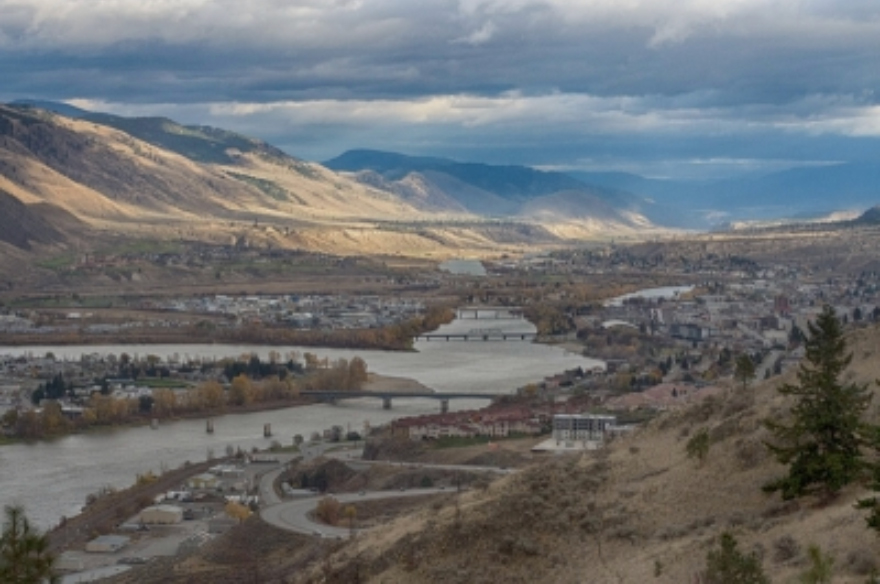
I grew up in a small city in BC, and I was a teenager when we finally got a Wendy’s restaurant in town (McDonald’s was well established with 2 locations across town from each other). I remember being astounded that the Wendy’s had opened up right next to McDonalds, and asking my dad (as we munched our Whopper and fries) “why did they open up right next door? Aren’t they the competition? Aren’t they worried people will just walk across the street to MacDonald’s?”
Thus began my education in cluster economics, as dad assured me it was all strategic, that when people wanted fast food, this was the location they’d come to, and both restaurants would benefit in the long run (and they did, as they are still there, and thriving, along with a dozen other restaurants that opened up in that block in the years since).
(Naturally my dad would know this - he was a car dealer and where was his dealership located? Right next to his competition on the ‘auto mile’).
But while geographic proximity is important in a cluster, that's really just the first step - similar businesses located near each other is not a true cluster.
What Makes a True Cluster? Connections & Collaborations
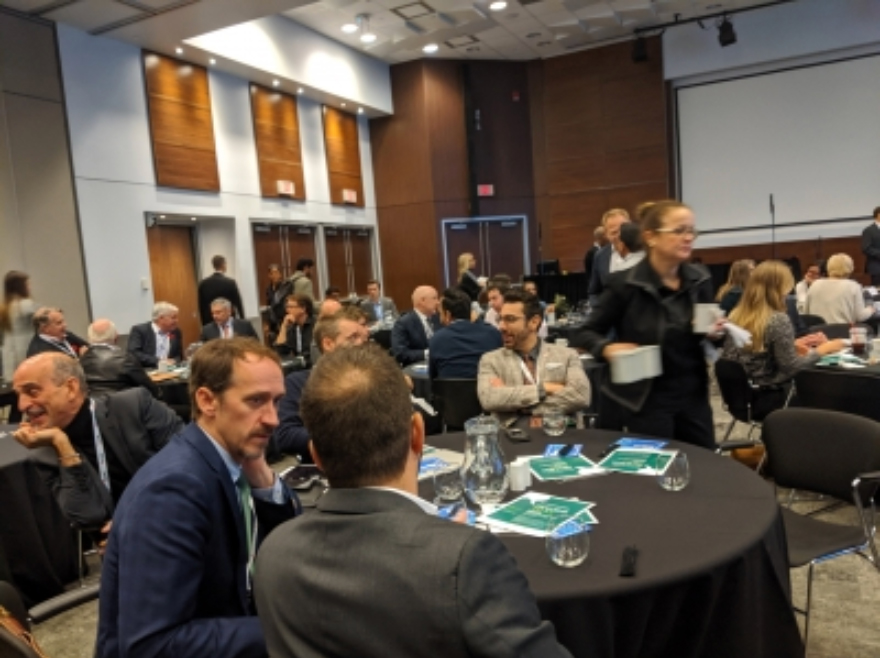
A cluster is not just about competition between companies that attract the same clients and sell similar products - cluster economics gets really powerful when it talks about inter-connected firms.
(for example, the hamburger restaurants might attract a bakery that specializes in hamburger buns to locate there, or restaurant or bakery equipment suppliers and then restaurant training programs or point of sale software developers, etc.)
That is when a cluster moves from “latent’ to emerging - when inter-connections and collaborations start to happen.
BC Example
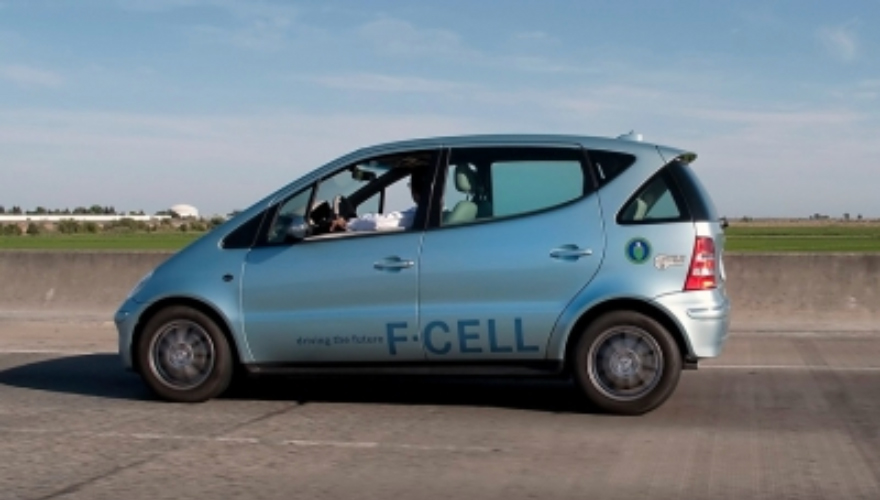
In British Columbia, the cleantech industry has a good example of this in the number of ‘spinoff’ companies that have come from Ballard Power since it was founded in 1979 in Burnaby. There’s now a cluster of companies like Hydra Energy or Hydrogen-in-Motion or even battery companies like Zinc8 - interconnected firms working in cleantech in the transportation sector and located in the Lower Mainland.
This is what differentiates a cluster from a single industry ‘auto mile’ type situation - in regions that experience robust job and economic growth there tends to be economic activities that are related enough to allow for effective specialization but offer enough variety that they can evolve into new industries and activities should the old ones experience decline.
In other words, they are interdependent and working together in a network, cluster type of relationship with each other - there is a dynamic nature to it.
Not only is a group of geographically and operationally linked businesses more robust, they also start to develop other economic advantages as they grow. Trust builds up as there are more opportunities for networking, collaboration and knowledge sharing. The local talent pool starts to deepen. A buzz begins to build, attracting customers and investments …
How Do You know if You Have a Cluster?
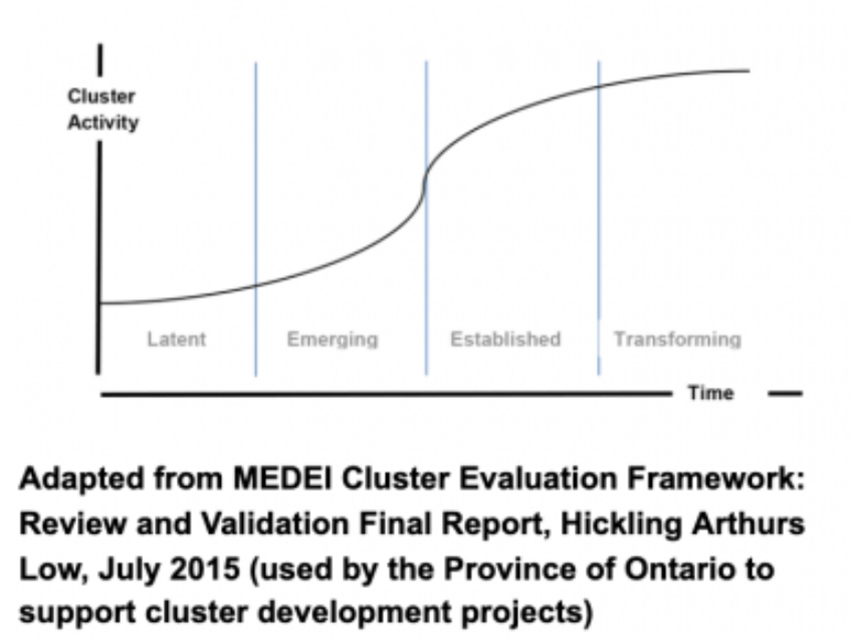
There are a number of economic activities that indicate an emerging cluster in a region: a) lead or anchor companies or research institutes are spinning-off new companies, b) new actors in the same or related activities emerge or are attracted to the region, c) stronger linkages between companies are occurring and d) entrepreneurs are taking initial steps to create formal or informal cluster.
The simple line diagram above shows the four stages of a cluster’s life cycle across time: the longer a cluster exists, the greater the clustered activity.
The Good News? A Cluster Can be Energized
An emerging cluster is good news. Strong and evolving clusters provide jobs, wealth and economic stability to a region.
While clusters are a naturally occurring phenomenon, once identified, they provide an opportunity for energizing and raising competitiveness of the region through strategic cluster activities, tools and support structures - a cluster project.
(Cluster activities vary, but include things like facilitating partnerships, sharing information, providing collaborative marketing opportunities, running industry challenges, mentorship/ educational programs, opening up global markets/assisting in export development efforts, etc)
In the context of cleantech, this means that if we take a good look at what’s going on in BC, and start thinking strategically about how to energize and improve upon what’s going well, and fill in the gaps/provide support in areas that need it, i.e. support the emerging cluster, then we can make an impact.
That’s what a cluster project and cluster initiatives are all about.
European Examples
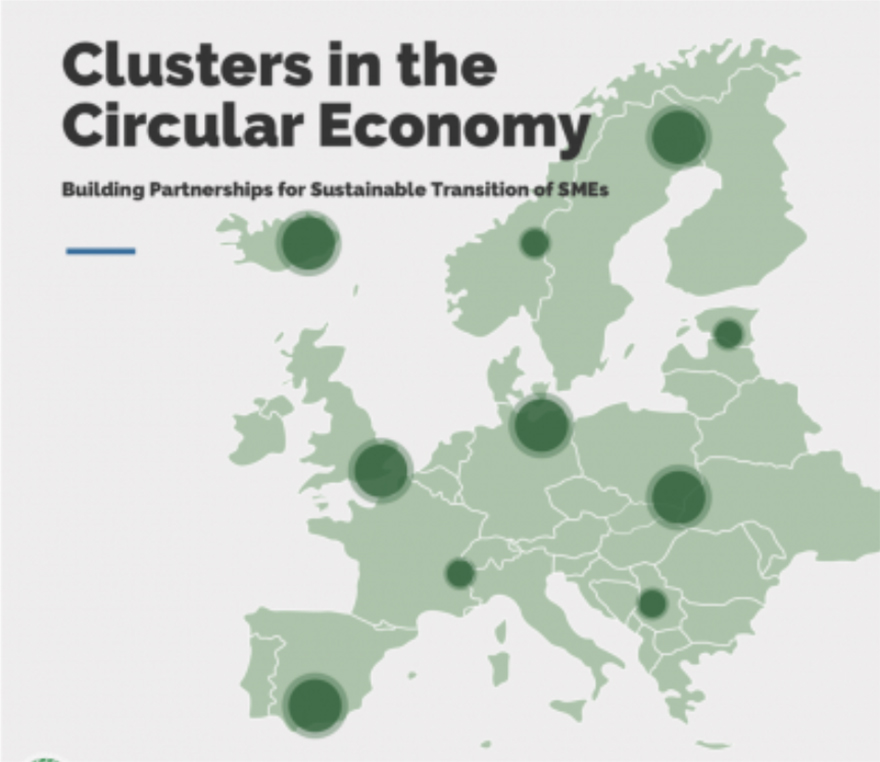
According to the European Cluster Collaboration Platform, there are at least 250 green clusters in Europe daily pushing the green transition forward:
“Helping companies to access the newest knowledge, testing new green business ideas and developing new green innovations. All of this accelerating, changing and supporting European businesses to be more focused on the way forward for a more sustainable world with better preservation of resources and environment." - Dr. Ulla Engelmann, Head of Unit Advanced Technologies, Clusters and Social Economy at DG GROW
Can BC Become a Cleantech Innovation Powerhouse?
The forces that drive innovation, the exponential change that the Office of the Innovation Commissioner referred to in their recent report, are coming at this province full force, and all at once. Uncertainty around global markets, trade wars, the impact of climate change (especially around sea levels for Coastal BC and the impact of forest fires in the Interior), increasing urbanization, population growth - a whirlwind of economic forces are converging and pushing innovation.
In BC, policy is also driving change, especially the CleanBC climate action plan. CleanBC is a gamechanger and sets out some focused and clean directives for businesses.
But it’s not going to solve our problems all on its own - the government itself acknowledges that “actions within the CleanBC plan will get us 75% of the way to our 2030 greenhouse gas reduction targets.”
The other 25% is going to come from elsewhere - from the people and businesses of BC.
Rowing Together
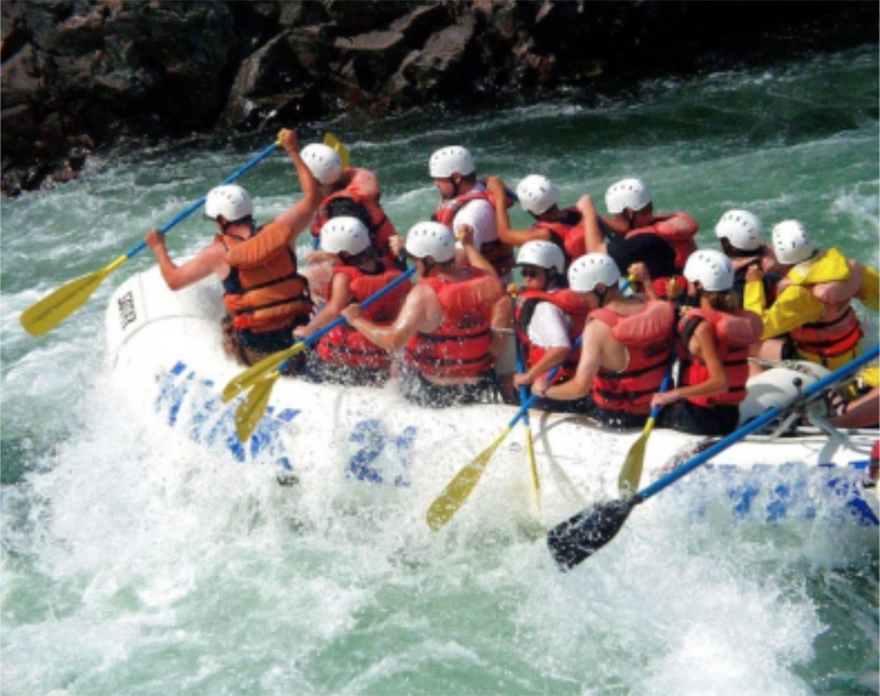
In other words, we have to adapt and innovate. Get in the boat and row together toward a path that isn’t entirely clear and laid out for us.
Cluster projects all over the world are driving innovation in strategic directions, and they have the data to prove the economic impact they’re having.
That’s what a Cluster project in BC can do - energize the emerging cleantech ecosystem toward strategic innovation, toward filling that 25% gap.
The forces of change may be barrelling down on us, but BC has what it takes - the knowledge, the academic/research excellence, an ecosystem of world class cleantech SME’s (who are making a splash on the world stage), strong mature industries backing them up, and a frontier culture of entrepreneurship.
So, of course we can become an Innovation Powerhouse.
We just need to work together.



